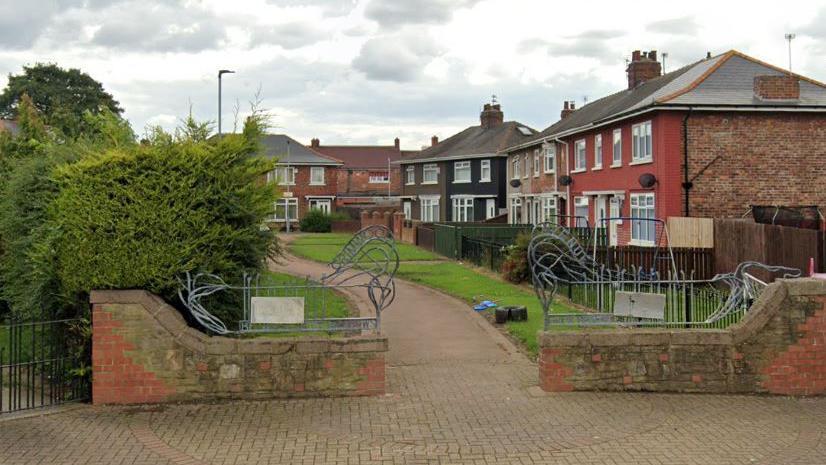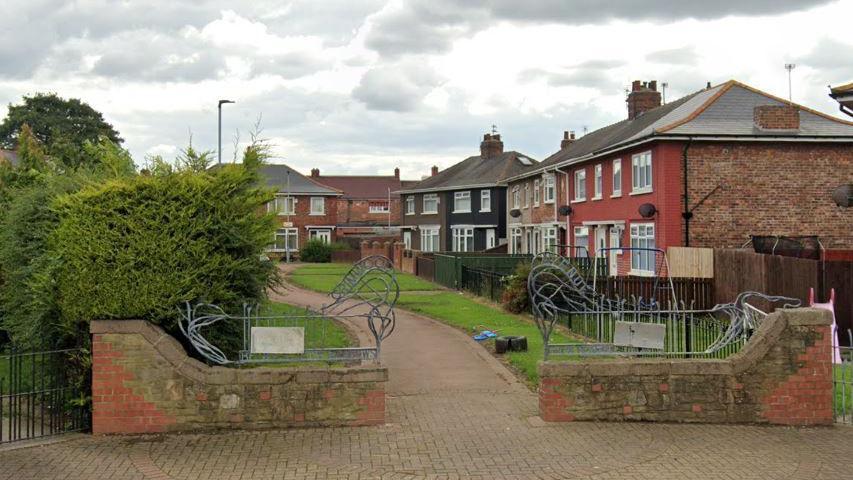Murder accused and victim 'like brother and sister'

Glenna Siviter was found dead at her home on Grimwood Avenue, Middlesbrough, in December
- Published
A man accused of murdering a woman for her jewellery to sell for drugs was like a "brother" to her, a court has heard.
Prosecutors allege Glenna Siviter, 50, was murdered at her Middlesbrough home by Andrew Hall.
She had been stabbed 36 times and her jewellery and passports were stolen, Newcastle Crown Court has heard.
Mr Hall, 46, of Thorntree Avenue in Middlesbrough, has denied murder.
'Drug-induced psychosis'
Mr Hall's long-term partner, who cannot be identified, told jurors Mr Hall and Ms Siviter had known each other since childhood.
The woman said they were "like brother and sister" and "always hugging", adding: "If we ever had an argument and he left, I could guarantee [Mr Hall] would be with Glenna."
The court has heard Ms Siviter, who used heroin and crack cocaine, was expressing paranoid thoughts in the lead up to her death and believed she was being followed and watched.
The woman said it was "evident" Ms Siviter had some form of "drug-induced psychosis" and had a different view of reality.
'Happy life'
She said Ms Siviter believed her family had deliberately got her back on drugs and wanted to "kill her off" to get her money and the contents of an aunt's will of which she was the executor.
The woman said she had only ever seen Mr Hall "comfort" Ms Siviter, who had moved back to Middlesbrough after spending 20 years living in Jersey.
She said she last saw Ms Siviter the week before she died and that she was in a terrible state through drug use.
The woman said both she and Mr Hall were "dumbfounded" about what to do for her, adding Mr Hall was "concerned about who she was associating with and the people in her house".
The woman said she and Mr Hall had had a "fabulous relationship" and "happy life" until he started using drugs and drink.
She said he would become "angry at his own shadow" after drinking.
'Energy usage change'
Prosecutors allege Ms Siviter was killed four days before her body was discovered.
The court has heard her mobile phone was last used at about 02:50 GMT on 11 December, with a man seen on CCTV entering her Grimwood Avenue home 10 minutes later.
Prosecutors claim that was Mr Hall must have killed Ms Siviter shortly after.
Home office pathologist, Dr Jennifer Bolton, previously told jurors the time of death was "not possible to determine precisely".
But, she said, Ms Siviter's death was "closer to the time her mobile phone was used" than to when her body was discovered.
In a statement, her electricity supplier said there was a "marked change" in her home's power usage from the early hours of 11 December.
The company, which was able to monitor activity through a smart meter, said before then there were "fluctuations" in usage which would be normal when a house was occupied.
But after 11 December, there was "no change in usage" which would only usually be found in an unoccupied house.
'Very vulnerable position'
The court has heard Ms Siviter's sister went to the house to get some clothes on 14 December but noticed nothing unusual.
Her body was found the following day by her son, hidden beneath a living room sofa.
A paramedic who attended on 15 December said she was surprised at the lack of blood around Ms Siviter, given the number of injuries that had obviously been inflicted.
Dr Bolton said there were 36 stab wounds to her head, neck and torso and 25 other knife marks consistent with a slashing motion.
She said there was also a "blunt force" injury to her head which may have "incapacitated" her and left her in a "very vulnerable position" in which she was "not able to defend herself".
Stabbed heart
Dr Bolton said there were marks on her arms which could have been caused by her trying to protect her head, but not the usual defensive marks that would be expected on her hands.
The pathologist said most of the injuries would have required "mild to moderate force" to inflict and none were "immediately fatal".
While there was cocaine and possibly heroin in Ms Siviter's system, they would not have contributed to her death, Dr Bolton said.
The pathologist concluded the cause of death was stab injuries to the neck and torso, one of which severed a jugular vein, another punctured a lung and two more damaged her heart.
Mr Hall also denies the attempted murder of two men who were stabbed in the days between Ms Siviter's death and discovery of her body.
The trial continues.
Follow BBC Tees on X (formerly Twitter), external, Facebook, external and Instagram, external. Send your story ideas to northeastandcumbria@bbc.co.uk.
Related topics
More stories from BBC North East and Cumbria
- Published11 June 2024
